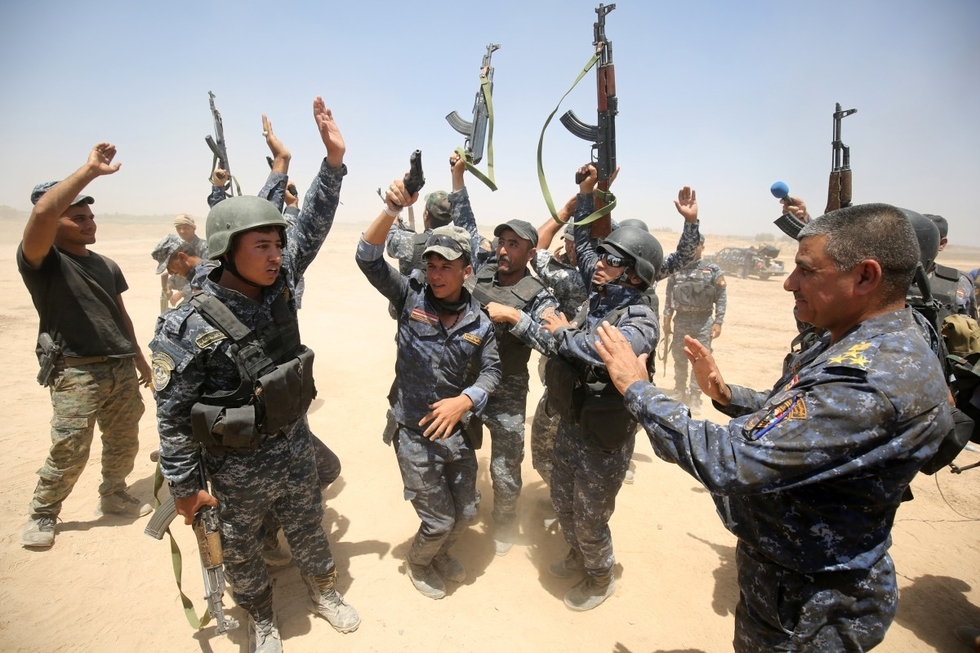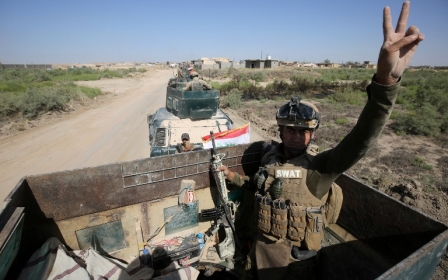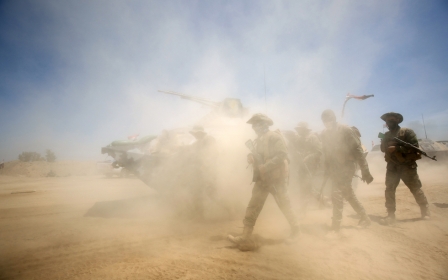Militias hail 'end of the Islamic State' as scores killed in Fallujah battle

KARBALA, Iraq - The fight against the Islamic State (IS) group in Fallujah has been gathering pace in Iraq, with the Baghdad Command Centre reporting over 140 members of the group killed or injured on Saturday.
In spite of recent gains against IS, casualties from the military and paramilitary forces involved in the operation have continued to mount, with reports that up to 45 anti-IS fighters were killed in two separate car bombings on the outskirts of Fallujah on Saturday.
Hakim al-Assad, a volunteer with the Abu al-Fadl al-Abbas Forces, was injured by an IS sniper in Fallujah on 24 May, and is now recuperating in the Imam al-Hussein Medical City in Karbala, which has a section specifically designated for soldiers from the Iraqi army and volunteers with the Popular Mobilisation Units (PMUs).
Though a government budget crisis means the Medical City began charging patients in March, the PMUs and Iraq military soldiers are provided free healthcare at the facility.
Despite the obvious setbacks in the campaign he is involved in, Hakim was optimistic about the Fallujah operation and keen to rejoin the fighting once he has recuperated.
“It’s nearly over,” he said. “It’s nearly completely liberated.”
“God willing, after Fallujah, we’ll head up to Mosul,” he added, referring to the main IS stronghold in Iraq, which fell to the group in June 2014.
Abbas Muhammed, another injured fighter with the Abu al-Fadl al-Abbas Forces, wearing an eye patch in the bed opposite, echoed Hakim's hopes.
“This is end of the Islamic State," he said.
The Iraqi army, along with the PMUs and a US-led anti-IS coalition last week launched their operation to retake Fallujah, which has been under IS control since January 2014.
“We’ve killed more than 70 enemy fighters, including Maher Al-Bilawi, who is the commander of ISIL [IS] forces in Fallujah,” coalition spokesperson Steve Warren said on Saturday.
"This, of course, won't completely cause the enemy to stop fighting, but it's a blow. It creates confusion and it causes the second-in-command to have to move up. It causes other leadership to have to move around.”
He added that over the past four days 20 strikes in the city had destroyed IS fighting positions and gun emplacements.
Hakim, while welcoming assistance against IS, disputed claims that US air support was playing a major role.
“There are fighter jets, we see them. However, we don’t see any air strikes being targeted on the enemy,” he told MEE.
One injured private from the Iraqi army - whose identity MEE was not permitted to disclose - said that he would not welcome US support anyway.
"I don't want any interference from any other country," he said. "This is our country, we want to liberate it."
Liberation of Fallujah
The fight against IS in Fallujah is seen as one of the most symbolically and strategically important battles against the group.
Once Fallujah - which has long been a battleground between successive governments and Sunni militants - is back in government hands, Mosul will be the only Iraqi city still controlled by IS.
However, the presence of the PMUs in the campaign against Fallujah has proved controversial. The groups, which are for the most part heavily influenced by Shia religious symbolism, have been accused of being highly sectarian and carrying out collective punishment on Sunni civilians, who some accuse of having harboured and actively supported IS.
Perhaps in response to such fears, Abu Mahdi al-Muhandis, an Iraqi military commander with oversight over the PMUs, issued a warning on Wednesday to the groups urging them to respect the rights of Fallujah citizens and not regard them as enemies.
“The residents of the areas of Fallujah undergoing liberation are our people,” read the statement.
“The purpose of the operations seeking to liberate Fallujah is to bring security and peace back to the city, and to rid it of terrorism.”
More than 50,000 civilians are thought to be trapped in Fallujah, prevented from leaving by IS. Some reports even suggested human shields were being used.
Though the UN says that around 800 people have escaped from Fallujah in the past week, many more are thought to be holed up in the centre of the city, where IS control is at its strongest.
Despite controversy over the role of the PMUs, Abbas Muhammed dismissed claims that Sunni civilians were more scared of the groups than they were of IS.
“They embraced us,” he told MEE. “They were happy that we were here to free their land.”
The injured private said that the Iraqi army considered the PMUs and the army "as one" during operations to defeat IS, and was happy to accept their support in the Fallujah operation.
However, he suggested that once IS was fully defeated in Iraq, he would like to see the PMUs folded into the regular army.
Baghdad unrest
Despite advances on the ground, continuing political turmoil in the capital Baghdad has been seen by some as a setback in the anti-IS campaign.
On Friday, security forces opened fire with tear gas and rubber bullets against protesters affiliated with the charismatic Shia cleric Muqtada al-Sadr as they demonstrated against continuing deadlock over political talks to introduce a new technocratic government in Iraq.
In addition, Baghdad has seen more than a hundred people killed by bomb attacks in recent weeks, which some have suggested could have been aggravated by the unrest in the city.
“It is negatively impacting our liberation because by doing [this] we are opening a new internal front within the civilian area in Baghdad,” said Hakim, referring to the protests and the government response.
“We are already having a war on the outskirts of the city. We should not initiate another war within the city.”
He added, however, that neither the government nor the PMUs should intervene in the people’s right to protest, saying the government should act swiftly to remove “corrupt” ministers.
Amidst the turmoil, there have been some rumblings that the PMUs - seen as heroic and hugely popular in contrast to a deeply unpopular government - could begin to assert themselves more vigorously as political actors.
Hamed al-Jazaeery, the commander of the Saraya Khorasani militia, in March told Associated Press that he wanted the PMU to be “a third power in Iraq” modelled after the Iraqi Revolutionary Guard Corps.
Most alarmingly to some, Akram al-Kaabi, the leader of the Harakat al-Nujaba militia, told Iraqi television in November that he would overthrow the Iraqi government if ordered to by Iran’s Supreme Leader Ali Khamenei.
Both of the wounded PMU fighters MEE spoke to at Imam al-Hussein said they thought political involvement in the name of their militias would be the wrong course of action.
“Everyone has his own role,” said Abbas. “We’re not affiliated with politics.”
Hakim concurred.
“We leave the politics for the politicians,” he said.
“It’s not our role. We fight and we only fight. We have nothing to do with politics.”
Middle East Eye propose une couverture et une analyse indépendantes et incomparables du Moyen-Orient, de l’Afrique du Nord et d’autres régions du monde. Pour en savoir plus sur la reprise de ce contenu et les frais qui s’appliquent, veuillez remplir ce formulaire [en anglais]. Pour en savoir plus sur MEE, cliquez ici [en anglais].




